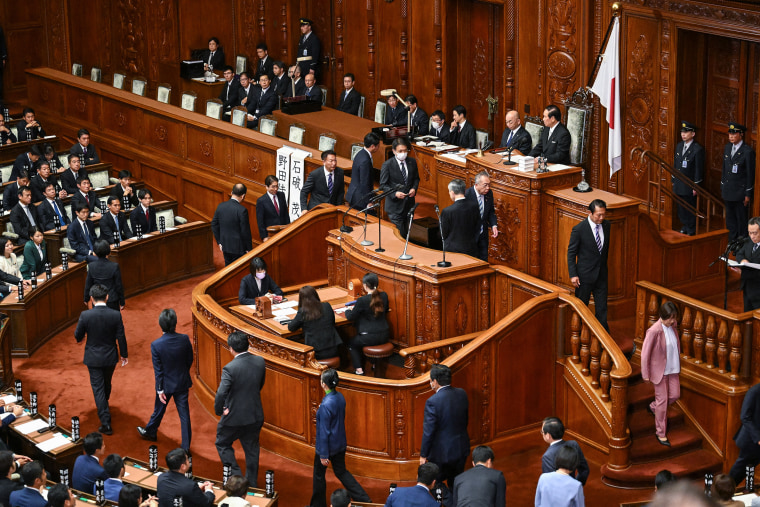TOKYO — Lawmakers in Japan voted Monday to retain the embattled Shigeru Ishiba as prime minister despite his long-governing party’s dismal showing in parliamentary elections last month.
Ishiba, 67, became prime minister of the key U.S. ally on Oct. 1 shortly after winning the leadership race for the Liberal Democratic Party (LDP), which has governed Japan almost uninterrupted since the end of World War II. But his future in the role was in question after the party suffered its worst election defeat in more than a decade, losing support from voters angry about corruption scandals and the rising cost of living.
That left the LDP without a parliamentary majority, but Ishiba was nonetheless able to retain his hold on power and will rule with a minority government. He must now face the challenges of a weakened and unpopular governing party as well as a possible shift in approach from Washington after the victory of President-elect Donald Trump.
Ishiba, a straight-talking former defense minister, received 221 votes compared with 160 for Yoshihiko Noda, leader of the opposition Constitutional Democratic Party. Other candidates received a total of 84 votes.
Japan, the world’s fourth-largest economy, “is faced with the most severe and complicated security environment in the postwar era,” Ishiba said Saturday at an annual troop review at a Japanese military base outside Tokyo, vowing to strengthen the country’s diplomatic efforts as well as its defense capabilities.
He cited violations of Japanese airspace in August and September by China and Russia, as well as a Chinese aircraft carrier entering Japan’s contiguous waters for the first time in September. Japan and other countries around the world are also concerned by accelerated weapons testing in nuclear-armed North Korea, which this year signed a mutual defense pact with Russia.

The U.S.-Japan alliance is the “cornerstone” of Japan’s diplomacy and security, said Ishiba, who said he and Trump had pledged to “work together to take the Japan-U.S. alliance to new heights” in a phone call after Trump’s election victory last week.
Japan has a lot to worry about from a second Trump presidency, Koichi Nakano, a visiting scholar at Harvard’s Weatherhead Program on U.S.-Japan Relations, told NBC News in an interview before the U.S. election last week.
Many Japanese officials assume Trump is going to be “more straightforwardly anti-China,” and that Japan will be “somehow miraculously left off the hook,” he said. But they are “misreading” the U.S. president-elect, he said, despite his famous friendship with the late Japanese Prime Minister Shinzo Abe.
Trump’s threat of tariffs should be taken “very seriously,” Nakano said, considering Japan’s widening trade surplus with the U.S., its top export destination. They could have “devastating” consequences for a country already wrestling with rising costs and a “very low” currency, he said.
Japan can also expect pressure from the Trump administration to spend more on defense, David Boling, director of Japan and Asian trade at the New York-based consulting firm Eurasia Group, said in a briefing after the U.S. election last week.
Though Japan has already pledged to double defense spending to 2% of gross domestic product by 2027, “that’s probably not going to be enough to satisfy Trump,” Boling said.
There is also strong U.S. opposition to Japanese company Nippon Steel’s $14.9 billion bid to acquire Pittsburgh-based U.S. Steel. President Joe Biden, Trump and his Democratic rival in the U.S. presidential race, Vice President Kamala Harris, had all come out against the deal.
“It looks pretty dead,” Boling said. The only way to revive it, he said, is for Nippon Steel to reach an agreement with United Steelworkers, a Pittsburgh-based union that has vocally opposed the takeover.
Takahiro Mori, vice chairman of Nippon Steel, told reporters last week that the company hoped to close the deal by the end of the year, before Trump takes office.
Much will come down to interpersonal relations. While Abe was “extraordinarily skillful” in dealing with Trump, Ishiba has a different personality, Boling said.
Ishiba “is more of a deep thinker type,” he said. “He’s known to be something of a defense intellectual, and I’m not sure that’s going to work that well with Trump.”
Japan does have a few things working in its favor, Boling said. It is unlikely to be at the top of Trump’s “trade target list,” and would do well to remind him that it is the top source of foreign direct investment in the United States.
The U.S. also “recognizes that Japan has really become an indispensable ally in the Indo-Pacific region, and that for Washington to have an effective policy on economic policy or national security policy directed towards China, it really needs Japan on its team,” Boling said.
Still, Trump’s second term could be challenging for Japan, where many see him as a “ticking time bomb” in terms of security and the global economy, Jeff Kingston, professor of Asian studies and history at Temple University’s Japan campus, said in an interview before the U.S. election.
“Certainly, I don’t think Trump would be a welcome partner. They saw how disastrous it was last time around,” Kingston said. “But Japan will adjust because the security environment is quite risky and they need the American security umbrella.”
Arata Yamamoto reported from Tokyo, and Jennifer Jett and Peter Guo reported from Hong Kong.
